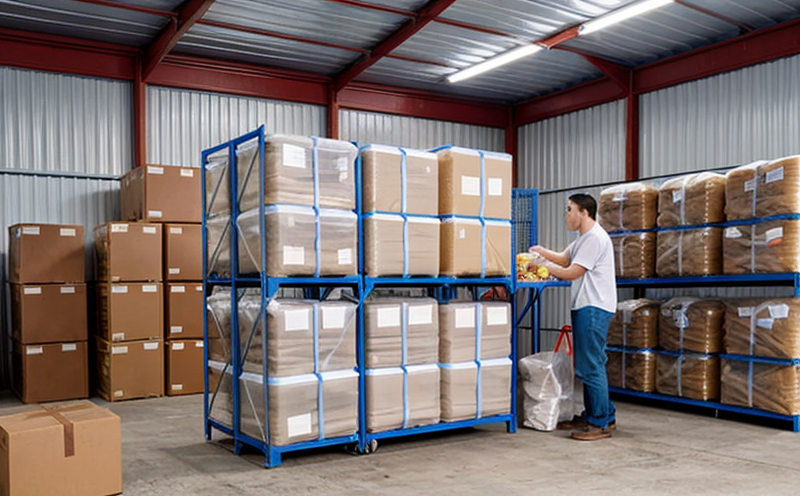Bagged goods storage inspection
The inspection of bagged goods in a warehouse or storage facility is critical to ensuring product quality and maintaining compliance with industry standards. Bagged goods include everything from agricultural products like grains, seeds, and produce, to industrial materials such as cement, chemicals, and pharmaceuticals. The purpose of this service is not only to inspect the physical condition of these bagged goods but also to verify their integrity for safe storage and subsequent distribution.
Inspecting bagged goods involves a series of detailed checks that ensure the goods are stored in optimal conditions. This includes verifying the packaging integrity, checking for any signs of contamination or damage, and assessing the environmental factors that could affect the quality and safety of these products. The inspection process must be thorough to prevent potential issues such as mold growth, pest infestation, or deterioration due to improper storage.
Bagged goods are often stored in large quantities within warehouses, making it essential for inspectors to have specialized knowledge and advanced tools. This service typically involves a combination of manual inspections and the use of non-destructive testing (NDT) methods such as X-ray inspection or ultrasonic testing when necessary. The NDT approach allows for detailed examination without altering the structure or integrity of the goods.
One key aspect of bagged goods storage inspection is ensuring compliance with relevant standards. For instance, ISO 21749 provides guidelines on quality assurance in the handling and storage of bulk solid materials, which can be applied to bagged goods as well. Compliance with these standards helps ensure that the storage practices are up-to-date and effective, reducing risks associated with poor-quality or improperly stored products.
The inspection process also involves assessing the environmental conditions within the warehouse. This includes temperature, humidity levels, and potential exposure to contaminants such as dust or chemicals. Maintaining proper environmental controls is crucial for preserving the quality of bagged goods over time. The use of advanced monitoring systems can help track these factors in real-time, providing early warnings if any parameters deviate from safe operating limits.
In addition to physical inspections and NDT methods, this service includes detailed documentation of findings and recommendations for corrective actions where necessary. This ensures transparency and accountability throughout the inspection process, allowing stakeholders to take appropriate measures promptly. By adhering to rigorous inspection protocols, we ensure that bagged goods are stored safely and efficiently, thereby enhancing overall operational efficiency within warehouses.
The scope of this service extends beyond just physical inspections; it encompasses a holistic approach to ensuring optimal storage conditions for various types of bagged goods. From raw materials used in manufacturing processes to finished products awaiting shipment, our team of experts can provide tailored solutions that meet specific client needs. Our goal is not only to identify potential issues but also to offer practical solutions aimed at preventing them from occurring again.
Benefits
- Ensures product quality and maintains compliance with industry standards.
- Prevents contamination, damage, and deterioration of stored goods.
- Reduces risks associated with poor-quality or improperly stored products.
- Maintains proper environmental controls to preserve the quality of bagged goods over time.
- Provides detailed documentation of findings and recommendations for corrective actions.
- Offers tailored solutions that meet specific client needs, enhancing overall operational efficiency within warehouses.
Environmental and Sustainability Contributions
The inspection of bagged goods in storage plays a crucial role in promoting environmental sustainability. By ensuring that the storage conditions are optimal, we help minimize waste by reducing spoilage rates. Properly stored goods are less likely to degrade prematurely or become unusable due to improper handling.
Moreover, this service supports sustainability efforts through its focus on minimizing energy consumption and emissions associated with warehouse operations. For example, maintaining controlled temperature and humidity levels helps reduce the need for excessive refrigeration or heating, which in turn lowers utility costs and greenhouse gas emissions.
The use of advanced monitoring systems allows us to track environmental factors such as temperature and humidity in real-time, providing early warnings if any parameters deviate from safe operating limits. This proactive approach enables swift corrective actions to be taken before significant damage occurs, further enhancing sustainability outcomes.
By adhering to rigorous inspection protocols and ensuring compliance with relevant standards like ISO 21749, we contribute to the broader goal of sustainable supply chain management. These practices help minimize waste and optimize resource use throughout the entire lifecycle of bagged goods from production to delivery.
Use Cases and Application Examples
| Use Case/Application Example | Description |
|---|---|
| Agricultural Products | Inspecting bags containing grains or seeds for signs of moisture, pest infestation, or mold growth. |
| Pharmaceuticals | Checking the integrity of sealed containers to ensure drug purity and prevent contamination. |
| Chemicals | Evaluating stored barrels for leaks or other defects that could lead to hazardous spills. |
| Packaging Materials | Assessing the structural integrity of plastic bags used in packaging processes. |
| Industrial Raw Materials | Verifying the consistency and quality of cement or concrete mixtures stored in bulk bags. |
| Paper Products | Checking stacks of paper for signs of water damage or mold that could affect printability. |
| Fresh Produce | Inspecting pallets of fruits and vegetables for bruising, discoloration, or other quality issues. |
- Agricultural Products: Inspecting bags containing grains or seeds for signs of moisture, pest infestation, or mold growth.
- Pharmaceuticals: Checking the integrity of sealed containers to ensure drug purity and prevent contamination.
- Chemicals: Evaluating stored barrels for leaks or other defects that could lead to hazardous spills.
- Packaging Materials: Assessing the structural integrity of plastic bags used in packaging processes.
- Industrial Raw Materials: Verifying the consistency and quality of cement or concrete mixtures stored in bulk bags.
- Paper Products: Checking stacks of paper for signs of water damage or mold that could affect printability.
- Fresh Produce: Inspecting pallets of fruits and vegetables for bruising, discoloration, or other quality issues.





